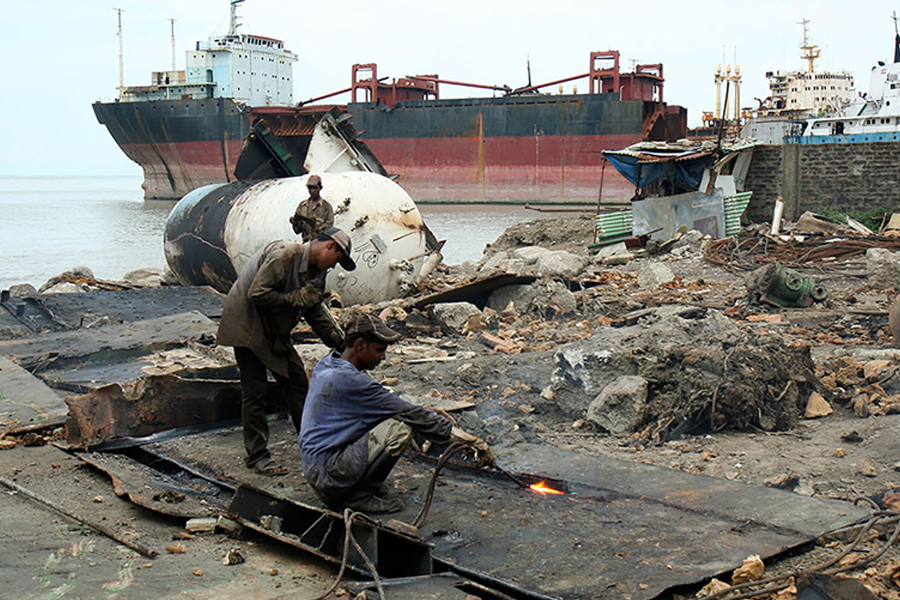
Published :
Updated :

The emergence of shipbreaking in the country decades ago has offered many positive and negative upshots. While the meteoric rise of the industry stirred by massive manual activities is highly risk-prone and environment-degrading, its contribution in terms of employment and feeding the country's booming steel and re-rolling mills can hardly be over exaggerated.
While the sector offers employment to around three hundred thousand workers, it has the proven capacity of supporting a vast array of heavy and light engineering industries. Iron rods and billets recycled from ship scraps, believed to be of high quality, meet a major portion of domestic requirement in the construction sector. Old ships meet 80 per cent of the demand of raw materials in the rerolling mills. Experts have opined that Bangladesh is a unique place for ship-breaking and ship-recycling as nearly all the products available from dismantled ships are being used locally. Moreover, as the advanced countries have given up on ship breaking because of the high cost of labour and accompanying compliance issues, ship breaking has all the prospects to thrive in countries like Bangladesh. It is thus of critical importance for those directly associated with the sector to make sure that the country is well poised to reap the gains from the opportunities offered by it. And this can only be done if the challenges associated with the task are met in a befitting manner.
The economic value of ship scrapping cannot be questioned, but there are serious concerns over safety and environmental hazards. There are threats too from potential sources of supply, such as the Norwegian Ship Owners' Association (NSA), not to allow recycling of their ships in Bangladesh, unless it is done in keeping with the Hong Kong International Convention for 'Safe and Environmentally Sound' recycling of ships. The Norwegian stand appears to be further reinforced by a reported move of the European Union, which accounts for 20 per cent of the total scrap vessels sold around the world, to ban export of scrap ships to Bangladesh and few other neighbouring countries. These, no doubt, are grave signals to reckon with, if the country is to see its ship breaking industry continue and thrive given the prospects. The concerns are not just expressions of anxiety as they used to be in the past, but are now clearly action-driven meant to cause a drastic cut in the availability of scrap vessels to be dismantled for recycling.
The fallouts have already begun to manifest. Currently, the country's ship-breaking industry is facing significant headwinds, with imports of scrapped vessels plunging by 36 per cent in the first half of 2025. The setback is largely due to new regulatory requirements, delayed clearances, and procedural complications under a stricter global compliance framework.
The country imported a total of 57 end-of-life ships during the January-June period this year, down from 89 ships in the same period of 2024, according to data released by the NGO Shipbreaking Platform (NSP), a global coalition advocating for safer and greener dismantling practices. Annual data also reflects a broader slowdown. Bangladesh dismantled 130 vessels in 2024, compared to 170 in 2023, 122 in 2022, and 254 in 2021. The number stood at 144 in 2020, 236 in 2019, and 185 in 2018. Industry insiders blame the sharp drop on the absence of DASR (Document of Authorisation to Conduct Ship Recycling), which is now mandatory under the HKC regime.
Lately it has been learnt that the Ministry of Industries has asked Bangladesh Ship Recycling Board (BSRB) to take necessary measures to issue DASR in favour of compliant yards for operating their ship recycling activities in line with the Hong Kong Convention. To this effect, the ministry last week issued a notification, acknowledging the necessity of issuance of the DASR after the final approval of the Ship Recycling Facilities Plan (SRFP) under the Hong Kong Convention.
Bangladesh had ratified the Hong Kong Convention in 2023, which came into force on June 26. Such a move came following a recent appeal from the ship breakers and recyclers in this regard. In this situation, until the laws, rules and policies are updated to implement the Hong Kong Convention, it is highly important to take necessary measures to issue DASR in favour of compliant yards to conduct ship recycling activities in line with the Convention. According to sources, the BSRB has decided to issue the DASR and requested ship recycling facilities (SRF) to apply for the same. The DASR will be issued to yards, SRF plans of those have got approval from industries ministry, a source said. However, the SRFs those are yet to be compliant in line with the Convention and do not receive the SOC (statement of compliance) will require to submit a transitional plan with a gap analysis of progress within the stipulated timeframe by an accredited organisation. According to the sector insiders, a total of 14 ship-breaking yards are compliant, while more than a dozen are in the process of fulfilling the requirements. Some seven Bangladeshi yards have so far obtained SoC with the Hong Kong Convention, according to NSP (NGO Shipbreaking Platform), a global coalition advocating for safer and greener dismantling practices.
Given the situation, expediting compliance with the Hong Kong convention demands urgent attention.
wasiahmed.bd@gmail.com


 For all latest news, follow The Financial Express Google News channel.
For all latest news, follow The Financial Express Google News channel.